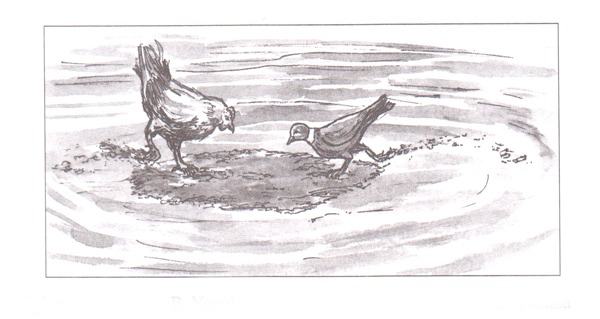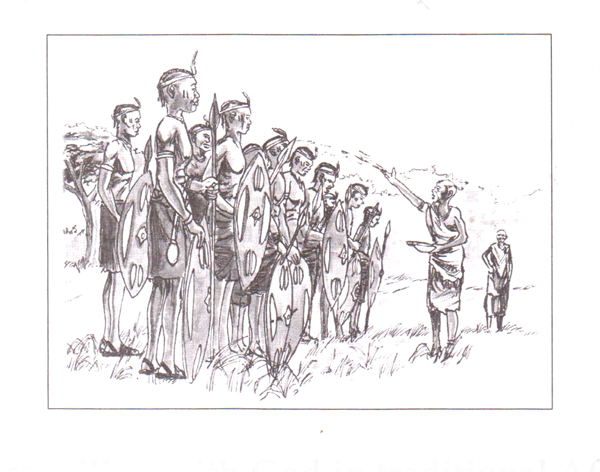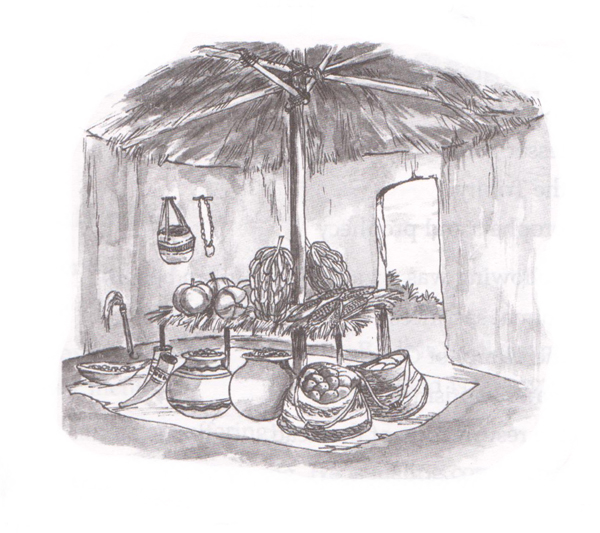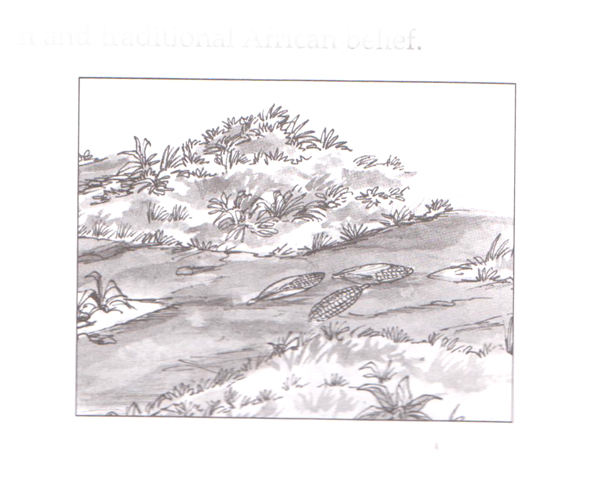| African heritage |
|---|
| Relationships |
| Continuity of life |
| Concepts of God |
| Beliefs and customs |
| New life in Africa |
| New life in Christianity |
| Ancestors |
| Assessment questions |
1. The creation story shown in the picture below in which the hen and the pigeon scratch the soil to make the earth is found in the _____ community.

A. Igbo B. Yoruba C. Fante D. Hausa
2. According to the Agikuyu, the first man and woman were
A. Gikuya and Wambu B. Gikuyu and Muumbe
C. Gikuyu and Mumbi C. Gikuyu and Murumwa
3. According to the traditional Yoruba of Nigeria, the supreme God and owner of the sky was called
A. Obatala B. Orishanla C. Chineke D. Olurun
4. Match the following communities with the names of their God.
(image)
5. Narrate the Bukusu story of creation.
5. Briefly narrate a creation stroy from any kenyan community.
1. Which of the following statement is not true about the living dead?
A. They are people who died but who are still remembered
B. They maybe people whoe died when we were young but we remember them.
C. They maybe people who died recently when we wer of age
D. They are people who died long before we were born
2. Which of the following statement is TRUE about ancestors?
A. They were people who died but we still remember
B. In some traditional Afrivan communities, it was belived people talked to God through ancestors
C. Christians pray to ancestors
D. All ansestors believed in Jesus Christ
3. Traditional African community did not approve of abortion. Drawing examples from different communities, support this statement showing how the unborn babies were respeced.
4. Explain the relationship between the living and ancestors in traditional African society.
5. The most important reason why the dead were buried with some of their items in some traditinal African communities was
A. people feared using a dead man's items
B. it was belived the dead person would need the item in the spirit world
C. people were so rich that everyone was buried with his belongings
D. the gods commanded that dead people's items be buried with the respective owners
1. Which of the following statement is TRUE about life in the traditional African community?
A. Life coes from the spirits
B. Life completely ended the day one dead
C. After death, life continued in the spirit world
D. There was a belief in the resurrection of the dead
2. Which of the following believe is ONLY found in Christianity and NOT n the traditional african sciety?
A. Life after death
B. Life is given by God or a supreme being
C. Resurrection of the dead
D. No person should take anther's life
3. Explain the importance of naming children after dead relatives in traditional African community.
4. Christians believe that when believes in Jesus Christ die, they
A. go straight to the new Jerusalem
B. go straight to hell
C. go to a place of rest as they await the day they will go to heaven
D. do straight to heaven
5. Christians believe that when the last trumpet sounds
A. The living shall be vaught up first
B. The dead shall rise up first
C. The ungodly will burn in their graves
C. The angle of God will slay the ungodly who will be alive
1. The following were stages of life in traditional African society
i) Birth (ii) Marriage (iii) Initiation (iv) Death (v) Naming
Arrange the stages from the last to the first
A. iv, v, iii, ii, i B. i, v, iii, ii, iv C. iv, iii, ii, v, iv D. iv, ii, iii, v, i
2. In your opinion, which was the most important stage of life in traditional African society. Give reasons for your answer.
3. Explain how traditional African society community showed respected to the unborn.
4. Which of the following statement proves the fact the life ws respected in the traditional African society
A. Abortion was only carried out by experienced midwives
B. Murder was punished severely
C. Ritual killing was allowed
D. None of the above
5. The special people who helped pregnant women to deliver in traditional African societies were called
A.diviners B. midwives C. matrons D. traditional nurses
1. In traditional African communities God was considered to be the _____ of life at birth.
A. sustainer B. giver C. destroyer D. finisher
2. The Yoruba of Nigeria called their God " The Owner of the Sky" because
A. He looked like the sky B. He had a home in the sky
C. He made the sky D None is correct
3. The concept of God projected in the name "Owner of the Throne" is that of a
A. Judge B. Magician C. King D. Prophet
4. The Nandi call their God Cheptalil which means "The Dazzling One". The concept of God projected by this name is of
A. fierce judgement B. majesty
C. holiness D. omnipresences
5. Give one name of God that projected Him as one who saw everything.
6. Which of the following names of God in christianity portrays Him as one who satisfies people's spiritial hunger?
A. The Vine B. The Ligth of the world
C. The Holy One D. Bread of Life
7. When Jesus wanted to emphasise our dependence on Him, He said He was
A. The Vine B. The Ligth of the world
C. The Holy One D. Bread of Life
8. Christians believe that God mage the heavens and the earth through His
A. Word B. Breath C. Hand D. Thoughts
9. Which of the following statement is NOT true about God in Christianity?
A. He is a King B. He is a Judge
C. He is Holy D. He is so loving He never judges anyone
1. The ceremony conducted in traditional African communities to specifically remove uncleanliness before worship was called
A. bathing B. ritual cleaning
C. forced ablution D. clarification
2. Which of the roles mentioned below was NOT the work of diviners and seers?
A. Foretelling the future
B. Informing people when God was annoyed
C. Telling people how to appease God
D. Casting evil spells in people
3. One of the ways in which people respond to God in traditional African socities was through consulting diviners. Discuss the importance of diviners
4. Explain two more other ways in which people responded toGod in traditional African society.
5. Look at the picture below and deduce the importance of the ritual shown

1. Name three ways through which people offended God in traditional African communities?
2. Explain how God punished an offending community in traditional African society.
3. Which of the following is NOT a way through which people reconciled with God in traditional African society?
A. Through prayer B. Through animal sacrifices
C. Through cleansing rituals D. Through water baptism
4. The picture shows a traditional African shrine with some offerings. Name two types of offering people to God in your community in the past

1. Which of the following is NOT a similarity of belief between christianity traditional A frican society? Belief in the existence
A. of life after death B. of supernatural being
B. of evil D. of one supreme Being in the Trinity
2. Explain the difference in the belief of life after death in Christianity and traditional African society.
3. The belief presence of evil in traditional African communities was evidence by
A. belief in witchcraft B. belief in ancestors
C. belief in the living dead D. belief in life after death
4. Describe two similarities between Christian and traditional belief.
5. The picture alongside shows maize cobs dropped on crossroads as offering to God in traditional African society. This was done before anyone ate any maize in any harvest. This traditional practice is equivalent to the Christian practise of

A. Tithing B. giving first fruits
C. diving alms D. giving to beggars
1. Which of the following is NOT a christian belief?
A. Belief in life after death
B. Belief in lesser gods
C. Belief in the trinity
D. Belief in prophets and prophecy
2. Which of the following was a traditional African belief?
A. Belief in animal sacrifices
B. Belief in the trinity of God
C. Belief in water baptism
D. Belief in the resurrection of the dead
3. The MAIN reason why christians do not offer animal sacrifices to appease God is because
A. God hates animal sacrifices
B. Jesus was the ultimate sacrifice
C. Christians do not have animals nowadays
D. None of the above is correct
4. The practise in the picture below is known as
(image)
A. offering B.libation C. ritual D. prayer